
Part of the Series
Moyers and Company
While the Federal Election Commission may be hopelessly gridlocked along partisan lines when it comes to campaign-finance regulation, another arm of the government is providing journalists and citizen watchdogs with an important new tool for understanding who is trying to influence the election and how much is being spent to do so.
On June 24, the Federal Communications Commission began requiring the nation’s radio broadcasters and cable television stations to upload all of their political ad contracts to a public online database. TV broadcasters have been doing so since the last presidential election. The FCC’s decision to expand its online public file is important in the context of campaign 2016 because it vastly expands the field of vision for reporters and citizen monitors who are trying to track the efforts of dark-money groups to influence the elections.
Dark-money groups refer to political organizations masquerading as social-welfare non-profits. Since the Supreme Court’s 2010 decision in Citizens United, they have become popular venues for big political donors who’d rather remain anonymous. Because of their tax-exempt status, such groups never have to make public the sources of their funding. And because they are considered corporations, they can, thanks to Citizens United, raise and spend unlimited amounts of money to influence elections. Unless outside groups’ expenditures come within 60 days of a primary election or 30 days of a general election, they never have to be reported on campaign-finance disclosures.
To see more stories like this, visit Moyers & Company at Truthout.
But the TV (and now radio and cable) stations that take the groups’ money do have to provide the FCC with copies of invoices, contracts — and, most significantly, a form identifying officers and board members of the actual people behind mystery-meat groups with names like “Americans for A Better America.” Such anodyne monikers could be a front for seasoned political operatives who have spun off a 501(c) to help politicians for whom they used to work. Or they could be hiding a coalition of, say, your local sludge producers who are trying to influence a municipal referendum on putting a dump in your backyard.
By adding radio and cable providers to its online database, the FCC is making it much easier to investigate advertisers in lower-budget local races, in which such groups can have a big impact. Before Friday, searching these ad records would have meant making an in-person visit to each station and rifling through drawers of paper, a task so daunting that very few citizens, academic researchers or news organizations would undertake it.
Initially, only radio stations in the nation’s top 50 markets will be required to participate in the database; the rule will apply to all radio stations in 2018. But every cable outlet with more than 1,000 subscribers must begin uploading files now.
For those who would like to try some political watchdogging from your home computers, here’s a how-to guide:
1. Surf on over to the FCC’s new, improved public files site: https://publicfiles.fcc.gov
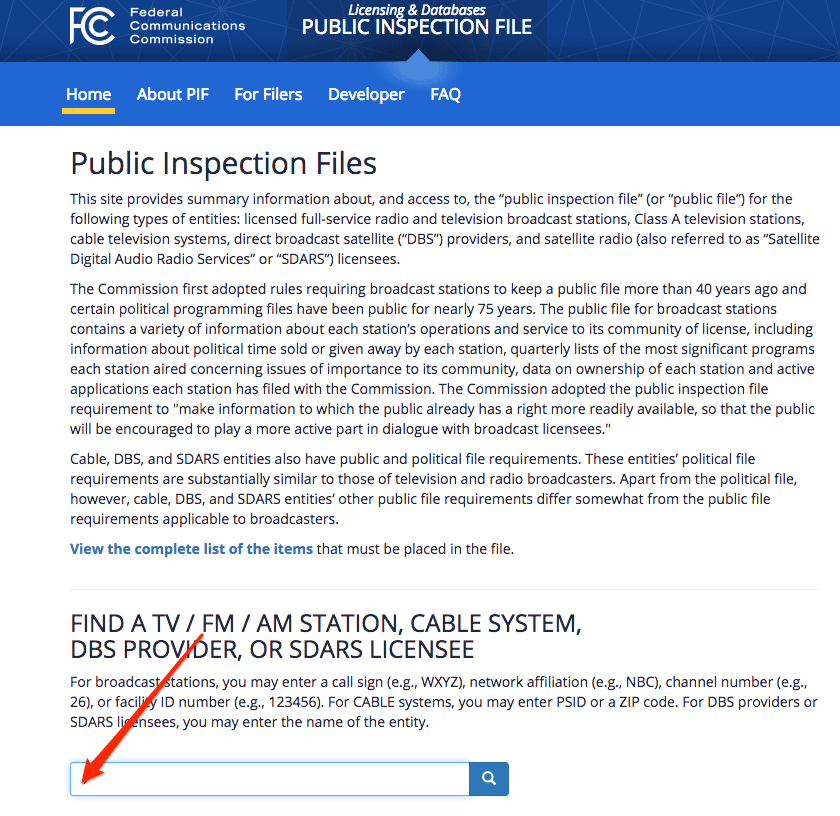
2. In the box at the bottom of the page, fill in the call letters of your local station, or the one where you have been hearing that annoying ad. That will take you to the page for that station’s page on the FCC website. For purposes of this demonstration, we’re using a TV station, as this is being written on the first day of electronic filing for radio and cable and not all of the newbies have functioning pages or uploaded documents yet. There’s lots of interesting information about the stations on this page, but to see the ads, you’ll want to hover over the vertical row of yellow icons at left. Choose the one that’s meant to look like a political button (HINT: follow our handy arrow).
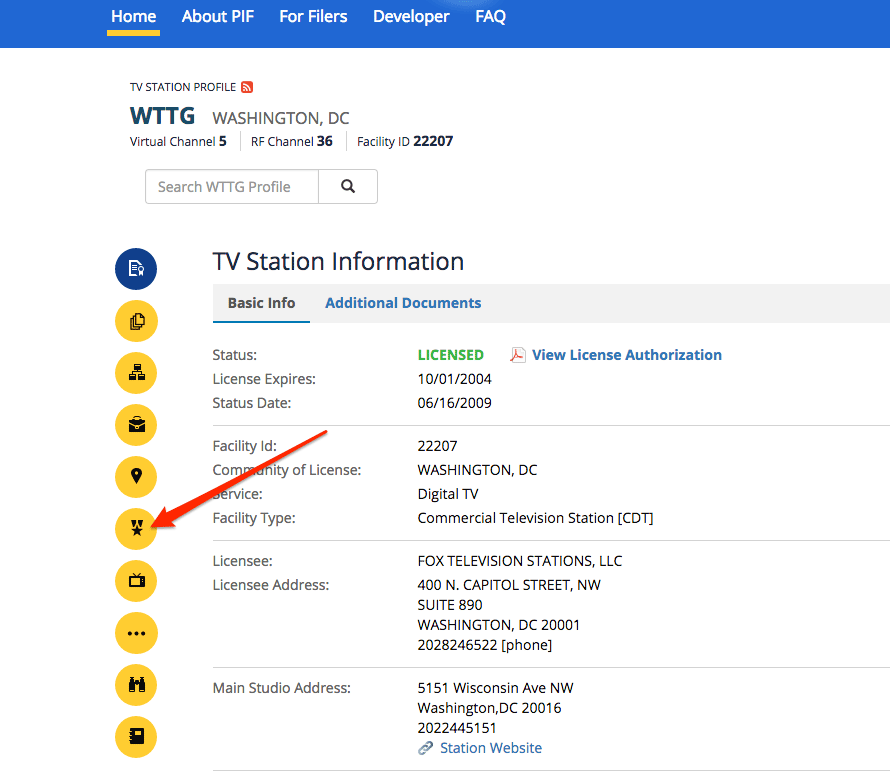
3. This takes you to a page listing the station’s political files year by year. Because WTTG is in Washington, one of the nation’s top-50 TV markets, it has file folders dating back to 2012, the first year the FCC began the online filing project. The ad paperwork for the current campaign should, of course, be in the 2016 folder. (If you can’t find something you know should be there, check other folders. Misfilings have been known to happen.)
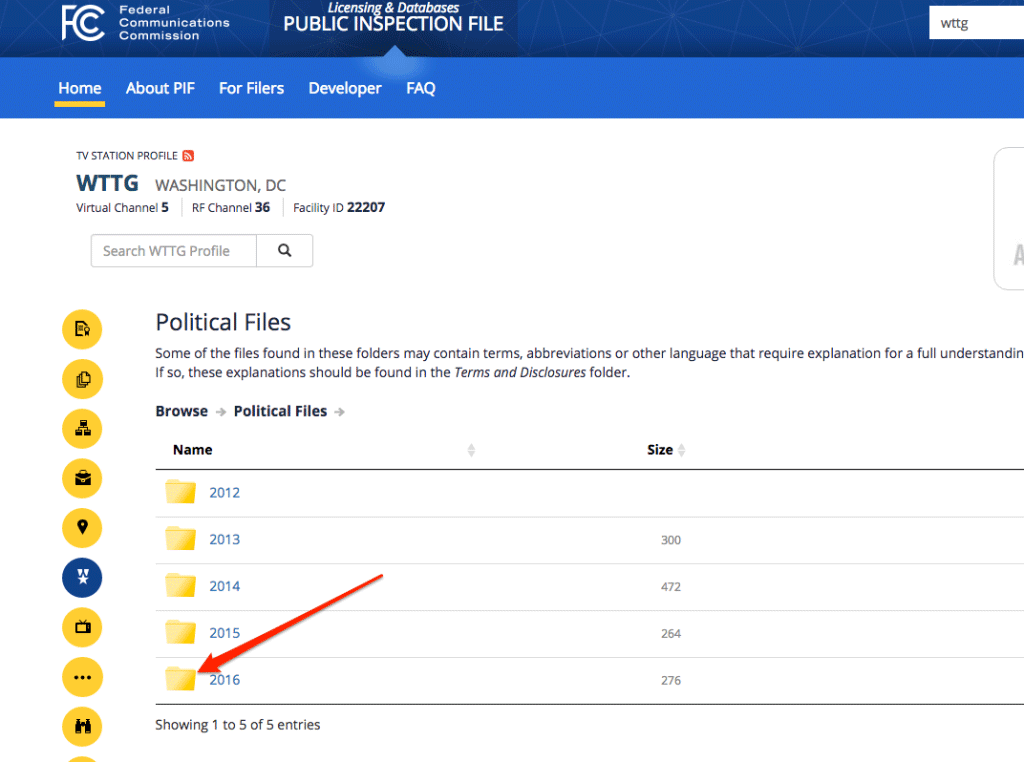
4. Click on the number of the year you want (the file folder icon doesn’t seem to be clickable). This will take you to a new page of folders that’s pretty self-explanatory. Ads for presidential and congressional candidates will be in the federal file, state officeholders in the state file and municipal officeholders in the local file. But the file that’s usually going to be the most interesting is the one for “non-candidate issue ads.” This is where the mystery-meat groups end up, whether they are buying ads on behalf of federal, state or local candidates.
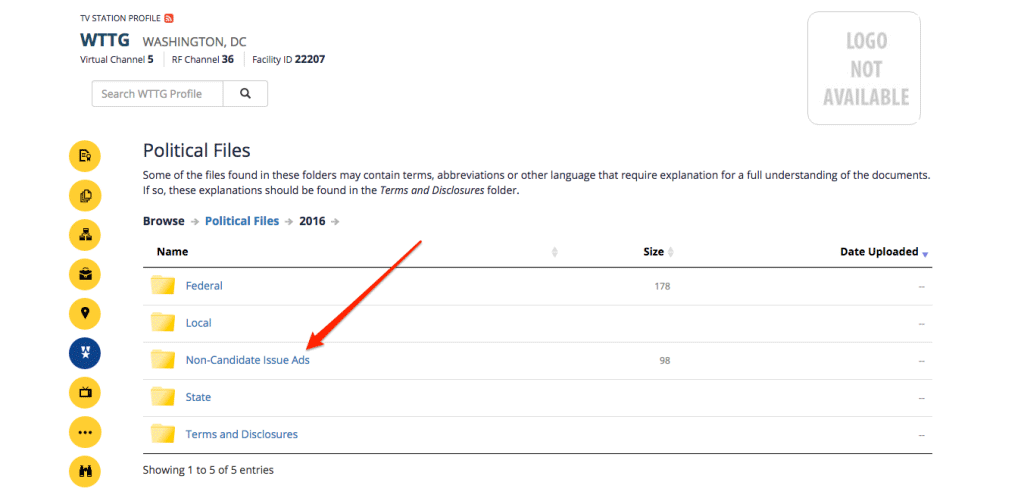
5. Click on the words “non-candidate issue ads” and you can see for yourself.
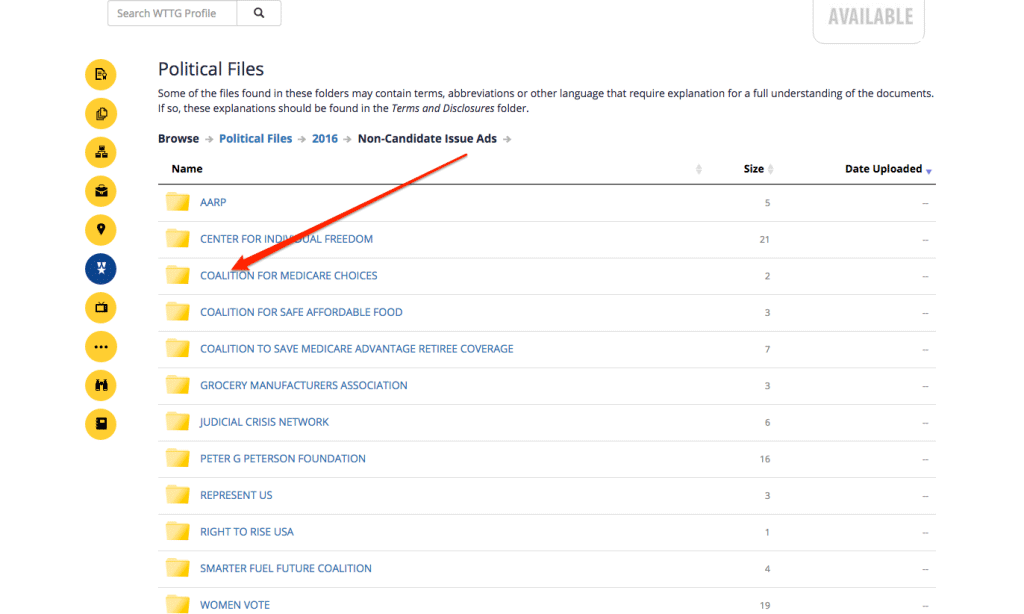
Let’s check out what’s inside the Coalition for Medicare Choices folder.
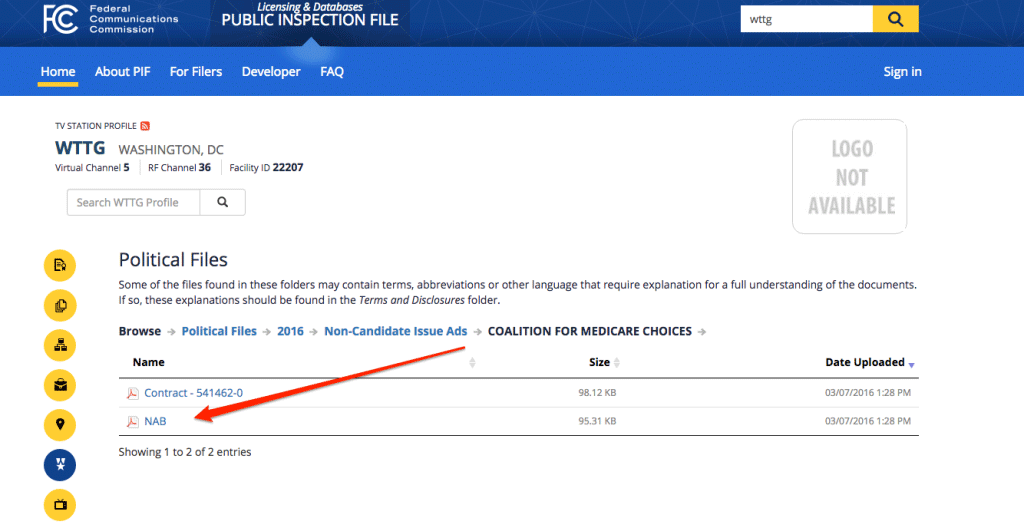
There are two documents: a contract, which we’ve uploaded here, for a $16,000 ad that ran on Fox News Sunday on March 13, and, what can be more interesting for watchdogs, the so-called NAB form (named after the National Association of Broadcasters that developed it). You can see that document here; if you scroll down, you will notice two items of information: an address and the name of the executive director. The address matches that of America’s Health Insurance Plans (AHIP). And, searching on the Web, we found a Beth Leonard, who is AHIP’s former executive vice president for public affairs, and is now chief communications and marketing officer for New York health insurer EmblemHealth.
The Coalition for Medicare Choices, meanwhile, has a website that identifies AHIP, the trade association of US health-insurance companies, as its founder. And while the FCC ad files don’t tell always us the titles of the ads being aired, this contract does tell us that the “product” involved is Medicare Advantage. So it’s probably a safe bet that the ad below, featured on the coalition’s YouTube channel, is the one that aired in Washington, just a few weeks before the government unveiled the rates it will pay insurers that sell Medicare Advantage.
Medicare Advantage is popular with seniors but some politicians and policymakers say it helps insurance companies more than customers. Former health-insurance executive Wendell Potter has denounced it as a cash cow for insurers that undermines the larger Medicare program. By airing the ad on a popular Washington, DC news program, the health insurers were reaching the lawmakers and policymakers most likely to influence the government’s decision. Knowing who is behind the ad, which features a series of attractive seniors but no mention of health-insurance companies, might alter the way viewers process the message.
So that’s how it works. Five steps to becoming a better-informed citizen, made infinitely easier by the FCC’s online database. In an era when newsrooms have been hollowed out, it’s more important than ever for citizens to develop some investigative chops. So give it a try.
Truthout Is Preparing to Meet Trump’s Agenda With Resistance at Every Turn
Dear Truthout Community,
If you feel rage, despondency, confusion and deep fear today, you are not alone. We’re feeling it too. We are heartsick. Facing down Trump’s fascist agenda, we are desperately worried about the most vulnerable people among us, including our loved ones and everyone in the Truthout community, and our minds are racing a million miles a minute to try to map out all that needs to be done.
We must give ourselves space to grieve and feel our fear, feel our rage, and keep in the forefront of our mind the stark truth that millions of real human lives are on the line. And simultaneously, we’ve got to get to work, take stock of our resources, and prepare to throw ourselves full force into the movement.
Journalism is a linchpin of that movement. Even as we are reeling, we’re summoning up all the energy we can to face down what’s coming, because we know that one of the sharpest weapons against fascism is publishing the truth.
There are many terrifying planks to the Trump agenda, and we plan to devote ourselves to reporting thoroughly on each one and, crucially, covering the movements resisting them. We also recognize that Trump is a dire threat to journalism itself, and that we must take this seriously from the outset.
Last week, the four of us sat down to have some hard but necessary conversations about Truthout under a Trump presidency. How would we defend our publication from an avalanche of far right lawsuits that seek to bankrupt us? How would we keep our reporters safe if they need to cover outbreaks of political violence, or if they are targeted by authorities? How will we urgently produce the practical analysis, tools and movement coverage that you need right now — breaking through our normal routines to meet a terrifying moment in ways that best serve you?
It will be a tough, scary four years to produce social justice-driven journalism. We need to deliver news, strategy, liberatory ideas, tools and movement-sparking solutions with a force that we never have had to before. And at the same time, we desperately need to protect our ability to do so.
We know this is such a painful moment and donations may understandably be the last thing on your mind. But we must ask for your support, which is needed in a new and urgent way.
We promise we will kick into an even higher gear to give you truthful news that cuts against the disinformation and vitriol and hate and violence. We promise to publish analyses that will serve the needs of the movements we all rely on to survive the next four years, and even build for the future. We promise to be responsive, to recognize you as members of our community with a vital stake and voice in this work.
Please dig deep if you can, but a donation of any amount will be a truly meaningful and tangible action in this cataclysmic historical moment. We are presently looking for 253 new monthly donors in the next 3 days.
We’re with you. Let’s do all we can to move forward together.
With love, rage, and solidarity,
Maya, Negin, Saima, and Ziggy